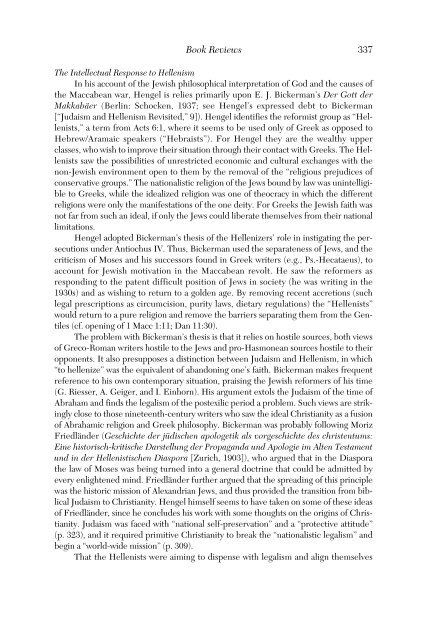Journal of Biblical Literature - Society of Biblical Literature
Journal of Biblical Literature - Society of Biblical Literature
Journal of Biblical Literature - Society of Biblical Literature
Create successful ePaper yourself
Turn your PDF publications into a flip-book with our unique Google optimized e-Paper software.
Book Reviews<br />
The Intellectual Response to Hellenism<br />
In his account <strong>of</strong> the Jewish philosophical interpretation <strong>of</strong> God and the causes <strong>of</strong><br />
the Maccabean war, Hengel is relies primarily upon E. J. Bickerman’s Der Gott der<br />
Makkabäer (Berlin: Schocken, 1937; see Hengel’s expressed debt to Bickerman<br />
[“Judaism and Hellenism Revisited,” 9]). Hengel identifies the reformist group as “Hellenists,”<br />
a term from Acts 6:1, where it seems to be used only <strong>of</strong> Greek as opposed to<br />
Hebrew/Aramaic speakers (“Hebraists”). For Hengel they are the wealthy upper<br />
classes, who wish to improve their situation through their contact with Greeks. The Hellenists<br />
saw the possibilities <strong>of</strong> unrestricted economic and cultural exchanges with the<br />
non-Jewish environment open to them by the removal <strong>of</strong> the “religious prejudices <strong>of</strong><br />
conservative groups.” The nationalistic religion <strong>of</strong> the Jews bound by law was unintelligible<br />
to Greeks, while the idealized religion was one <strong>of</strong> theocracy in which the different<br />
religions were only the manifestations <strong>of</strong> the one deity. For Greeks the Jewish faith was<br />
not far from such an ideal, if only the Jews could liberate themselves from their national<br />
limitations.<br />
Hengel adopted Bickerman’s thesis <strong>of</strong> the Hellenizers’ role in instigating the persecutions<br />
under Antiochus IV. Thus, Bickerman used the separateness <strong>of</strong> Jews, and the<br />
criticism <strong>of</strong> Moses and his successors found in Greek writers (e.g., Ps.-Hecataeus), to<br />
account for Jewish motivation in the Maccabean revolt. He saw the reformers as<br />
responding to the patent difficult position <strong>of</strong> Jews in society (he was writing in the<br />
1930s) and as wishing to return to a golden age. By removing recent accretions (such<br />
legal prescriptions as circumcision, purity laws, dietary regulations) the “Hellenists”<br />
would return to a pure religion and remove the barriers separating them from the Gentiles<br />
(cf. opening <strong>of</strong> 1 Macc 1:11; Dan 11:30).<br />
The problem with Bickerman’s thesis is that it relies on hostile sources, both views<br />
<strong>of</strong> Greco-Roman writers hostile to the Jews and pro-Hasmonean sources hostile to their<br />
opponents. It also presupposes a distinction between Judaism and Hellenism, in which<br />
“to hellenize” was the equivalent <strong>of</strong> abandoning one’s faith. Bickerman makes frequent<br />
reference to his own contemporary situation, praising the Jewish reformers <strong>of</strong> his time<br />
(G. Riesser, A. Geiger, and I. Einhorn). His argument extols the Judaism <strong>of</strong> the time <strong>of</strong><br />
Abraham and finds the legalism <strong>of</strong> the postexilic period a problem. Such views are strikingly<br />
close to those nineteenth-century writers who saw the ideal Christianity as a fusion<br />
<strong>of</strong> Abrahamic religion and Greek philosophy. Bickerman was probably following Moriz<br />
Friedländer (Geschichte der jüdischen apologetik als vorgeschichte des christentums:<br />
Eine historisch-kritische Darstellung der Propaganda und Apologie im Alten Testament<br />
und in der Hellenistischen Diaspora [Zurich, 1903]), who argued that in the Diaspora<br />
the law <strong>of</strong> Moses was being turned into a general doctrine that could be admitted by<br />
every enlightened mind. Friedländer further argued that the spreading <strong>of</strong> this principle<br />
was the historic mission <strong>of</strong> Alexandrian Jews, and thus provided the transition from biblical<br />
Judaism to Christianity. Hengel himself seems to have taken on some <strong>of</strong> these ideas<br />
<strong>of</strong> Friedländer, since he concludes his work with some thoughts on the origins <strong>of</strong> Christianity.<br />
Judaism was faced with “national self-preservation” and a “protective attitude”<br />
(p. 323), and it required primitive Christianity to break the “nationalistic legalism” and<br />
begin a “world-wide mission” (p. 309).<br />
That the Hellenists were aiming to dispense with legalism and align themselves<br />
337

















